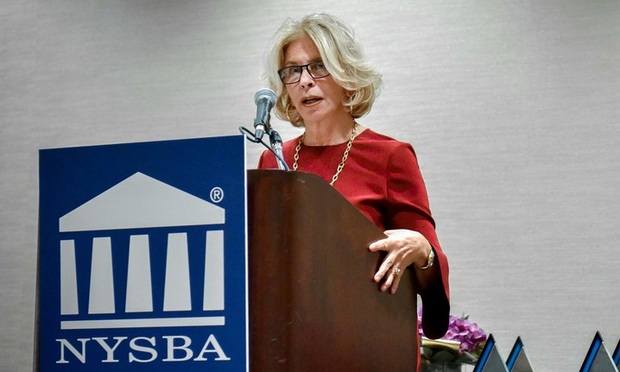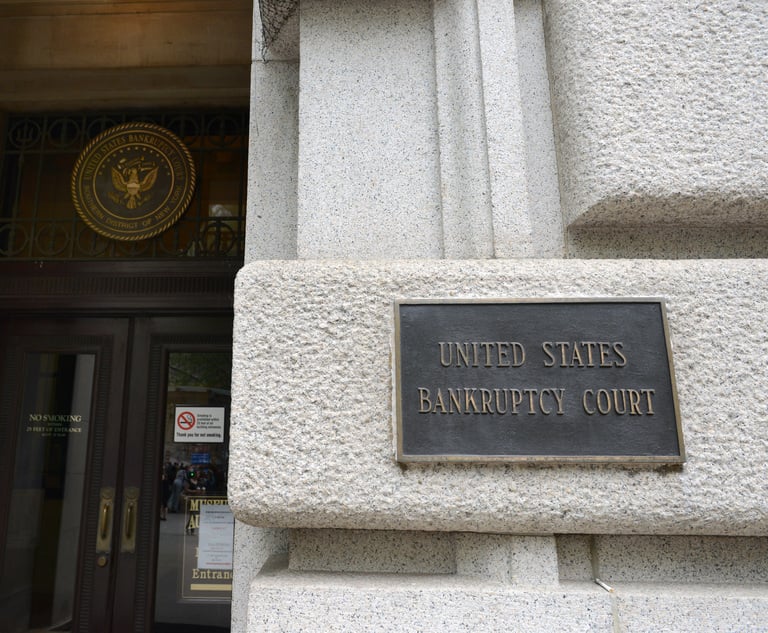Chief Judge Lauds New York for Legal Representation of Low-Income People
The percentage of low-income New Yorkers whose civil legal needs are now being met has risen to a high of 37 percent, up from 20 percent in 2013, Chief Judge Janet DiFiore said.
January 25, 2018 at 01:22 PM
3 minute read

New York has become the undisputed national leader when it comes to serving the civil legal needs of low-income people, Chief Judge Janet DiFiore told the state bar association Thursday at its annual meeting in New York City.
The percentage of low-income New Yorkers whose civil legal needs are now being met has risen to a high of 37 percent, up from 20 percent in 2013, she said, citing statistics from The Permanent Commission on Access to Justice.
Speaking at the bar's Justice for All luncheon, DiFiore said the progress was due in part to the recurring $100 million allocation in the state judiciary's budget to support grants to civil legal service providers, the largest amount by any state judiciary in the nation.
She also said that New York City's passage of a law guaranteeing free legal services to every low-income tenant facing eviction has made a tremendous difference. About 27 percent of these tenants who appear in the New York City Housing Court are now represented by counsel, up from just 1 percent in 2009, she said.
“On the criminal side, I can assure you that not only is New York making good progress in meeting its constitutional obligation to provide effective assistance of counsel to poor defendants, but we are well on our way to setting the national standard for a properly-funded, high-quality public defense system,” she said in her prepared remarks.
DiFiore noted new funding from the state to help in this area, such as approximately $50 million in Gov. Andrew Cuomo's executive budget released earlier this month. The funds are the end result of the long push that began in 2007 with the Hurrell-Harring v. NY. The suit against five upstate counties claimed that indigent criminal defendants were having their constitutional rights violated by the lack of effective and meaningful representation through New York's county-based public defender system.
The settlement in 2014 set the stage for new funding as part of the state's budget passed last year. Cuomo's executive budget proposal represents the first allocation.
“It is the responsibility of each of us to do our part to educate our policy makers and the public — that every dollar and every hour of pro bono invested in meeting the legal needs of the poor redounds to the benefit of our society many times over — by improving the lives of our neighbors and strengthening the quality of life in our communities,” she said.
In her remarks, DiFiore congratulated the honorees in the pro bono category: Caroline Heller of Greenberg Traurig, Ben Ostrer of Ostrer Associates and Phillip Hurwitz of Damon Barclay. She also paid tribute to firms that won in the pro bono category: Skadden, Arps, Slate, Meagher & Flom; Proskauer Rose; Willkie Farr & Gallagher, Phillips Lytle, Barclay Damon and Nixon Peabody.
This content has been archived. It is available through our partners, LexisNexis® and Bloomberg Law.
To view this content, please continue to their sites.
Not a Lexis Subscriber?
Subscribe Now
Not a Bloomberg Law Subscriber?
Subscribe Now
NOT FOR REPRINT
© 2025 ALM Global, LLC, All Rights Reserved. Request academic re-use from www.copyright.com. All other uses, submit a request to [email protected]. For more information visit Asset & Logo Licensing.
You Might Like
View All
Benjamin West and John Singleton Copley: American Painters in London
8 minute read
'A Regressive Institution': SDNY Judge Rakoff Delivers Pointed Remarks on SCOTUS in Recent Appearance
2 minute read
Federal Court That Faces Its Share of Real-Life Horrors Gets Into Halloween Spirit
1 minute readTrending Stories
Who Got The Work
Michael G. Bongiorno, Andrew Scott Dulberg and Elizabeth E. Driscoll from Wilmer Cutler Pickering Hale and Dorr have stepped in to represent Symbotic Inc., an A.I.-enabled technology platform that focuses on increasing supply chain efficiency, and other defendants in a pending shareholder derivative lawsuit. The case, filed Oct. 2 in Massachusetts District Court by the Brown Law Firm on behalf of Stephen Austen, accuses certain officers and directors of misleading investors in regard to Symbotic's potential for margin growth by failing to disclose that the company was not equipped to timely deploy its systems or manage expenses through project delays. The case, assigned to U.S. District Judge Nathaniel M. Gorton, is 1:24-cv-12522, Austen v. Cohen et al.
Who Got The Work
Edmund Polubinski and Marie Killmond of Davis Polk & Wardwell have entered appearances for data platform software development company MongoDB and other defendants in a pending shareholder derivative lawsuit. The action, filed Oct. 7 in New York Southern District Court by the Brown Law Firm, accuses the company's directors and/or officers of falsely expressing confidence in the company’s restructuring of its sales incentive plan and downplaying the severity of decreases in its upfront commitments. The case is 1:24-cv-07594, Roy v. Ittycheria et al.
Who Got The Work
Amy O. Bruchs and Kurt F. Ellison of Michael Best & Friedrich have entered appearances for Epic Systems Corp. in a pending employment discrimination lawsuit. The suit was filed Sept. 7 in Wisconsin Western District Court by Levine Eisberner LLC and Siri & Glimstad on behalf of a project manager who claims that he was wrongfully terminated after applying for a religious exemption to the defendant's COVID-19 vaccine mandate. The case, assigned to U.S. Magistrate Judge Anita Marie Boor, is 3:24-cv-00630, Secker, Nathan v. Epic Systems Corporation.
Who Got The Work
David X. Sullivan, Thomas J. Finn and Gregory A. Hall from McCarter & English have entered appearances for Sunrun Installation Services in a pending civil rights lawsuit. The complaint was filed Sept. 4 in Connecticut District Court by attorney Robert M. Berke on behalf of former employee George Edward Steins, who was arrested and charged with employing an unregistered home improvement salesperson. The complaint alleges that had Sunrun informed the Connecticut Department of Consumer Protection that the plaintiff's employment had ended in 2017 and that he no longer held Sunrun's home improvement contractor license, he would not have been hit with charges, which were dismissed in May 2024. The case, assigned to U.S. District Judge Jeffrey A. Meyer, is 3:24-cv-01423, Steins v. Sunrun, Inc. et al.
Who Got The Work
Greenberg Traurig shareholder Joshua L. Raskin has entered an appearance for boohoo.com UK Ltd. in a pending patent infringement lawsuit. The suit, filed Sept. 3 in Texas Eastern District Court by Rozier Hardt McDonough on behalf of Alto Dynamics, asserts five patents related to an online shopping platform. The case, assigned to U.S. District Judge Rodney Gilstrap, is 2:24-cv-00719, Alto Dynamics, LLC v. boohoo.com UK Limited.
Featured Firms
Law Offices of Gary Martin Hays & Associates, P.C.
(470) 294-1674
Law Offices of Mark E. Salomone
(857) 444-6468
Smith & Hassler
(713) 739-1250







